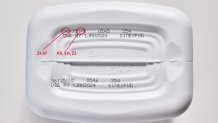The U.S. Food and Drug Administration advised against purchasing three types of Michigan-produced powdered infant formula, which has led to several infections when consumed.
In an update released Wednesday, the FDA said it is investigating complaints of Cronobacter sakazakii and Salmonella Newport infections, all of which were reported after consuming the infant formula produced from Abbott Nutrition’s Sturgis, Michigan facility.
The FDA has previously noted that the rare and dangerous germ, Cronobacter sakazakii, can cause blood infections and other serious complications.
Federal health officials advised against purchasing Similac, Alimentum and EleCare powdered infant formulas. The lot under investigation can be identified by the 7-to-9 digit code and expiration date on the bottom of the package, and include all three of these features:
Feeling out of the loop? We'll catch you up on the Chicago news you need to know. Sign up for the weekly Chicago Catch-Up newsletter here.
- The first two digits of the 7-to-9 digit code are 22-through-37,AND
- The code on the container contains K8, SH, or Z2, AND
- The expiration date is April 1 or later.


All four cases were hospitalized and Cronobacter could have led to a death in one case, the FDA said.
Local
During an onsite inspection in Michigan, health officials found "several positive Cronobacter sakazakii results from environmental samples taken by the FDA and adverse inspectional observations."
In a review of Abbott's internal records, the FDA found environmental contamination with Cronobacter sakazakii, as well as the company's destruction of products due to the presence of the toxic germ.
“As this is a product used as the sole source of nutrition for many of our nation’s newborns and infants, the FDA is deeply concerned about these reports of bacterial infections,” said Frank Yiannas, FDA Deputy Commissioner for Food Policy and Response. “We want to reassure the public that we’re working diligently with our partners to investigate complaints related to these products, which we recognize include infant formula produced at this facility, while we work to resolve this safety concern as quickly as possible."
According to the FDA, Conrobacter bacteria can cause life-threatening infections or meningitis. Symptoms of sepsis and meningitis can include poor feeding, irritability, temperature changes, yellowed-skin or eyes, grunting breaths and abnormal movements.
If your child is experiencing any of the symptoms, you are encouraged to call a health care provider immediately.
Abbott Nutrition had expanded a recall for the baby formula last month after a second infant died, U.S. Food and Drug Administration announced.
The child died after being hospitalized, and federal officials say that the illness may have been a contributing cause of death. The infant reportedly consumed Abbot Nutrition's Similac PM 60/40 with a lot code 27032K800 prior to contracting Cronobacter sakazakii infection, the FDA said.
Similac PM is a "specialty formula for certain infants who would benefit from lowered mineral intake." It was not included in the previous recall for certain lots of Similac, Alimentum and EleCare formulas announced Feb. 17.
The powdered infant formulas from that recall was also manufactured at Abbott Nutrition’s plant in Sturgis, Michigan.
At least four reports of Cronobacter sakazakii infections have been reported to FDA and the Centers for Disease Control and Prevention, and one Salmonella Newport infection has also been reported in connection with the outbreak.
All five infants who have been sickened have been hospitalized, and two of them have died.
Abbott Nutrition recalled Similac PM 60/40 powdered infant formula with Lot # 27032K80 (can) / Lot # 27032K800 (case) after learning of the second baby's death.
The infant formula was distributed for sale in the United States and in Israel.
Liquid baby formulas are not included in the recall, and consumers are advised to continue using product that has not been recalled.



